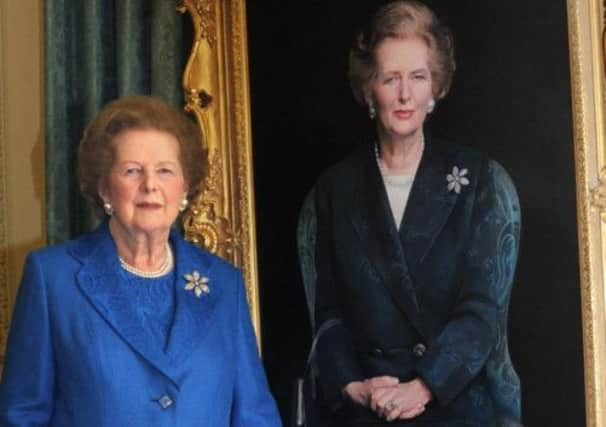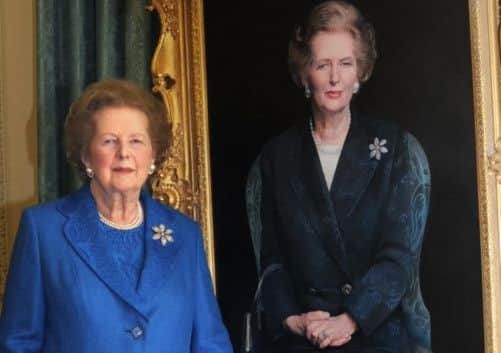Bernard Ingham: Her great quality was never wanting to be loved


MARGARET Thatcher changed the nature of Britain and raised the nation’s standing in the world. in the process she emerged victorious from a perilous military campaign to recover the Falklands, halted the UK’s economic decline, ended trade union anarchy, revived business enterprise and by sheer force of personality and honesty of purpose became a dominant world figure.
She had a wonderful capacity to polarise opinion while at the same time commanding respect. And she forced the Labour Party to redefine itself and make itself re-electable.
Advertisement
Hide AdAdvertisement
Hide AdIn my book, all this makes her the outstanding British peacetime Prime Minister of the 20th century.


She had only one rival – Clement Attlee (1945-51). But his nation-changing reforms, while controversial, were willed by the people after the privations of the 1930s.
Thatcher had to overcome prejudice against her sex and scepticism over Britain’s governability in 1979 in a far faster moving and media-ridden environment than that in which Attlee built his post-war socialist consensus – a consensus that she summarily ended.
All this was achieved, in stark contrast to Tony Blair, without much concern for what the media thought. she came to office without a Press secretary and asked the Cabinet secretary to find her one. sir Robert Armstrong’s choice fell on me after 12 years as Press secretary to such diverse Ministers as Barbara Castle, Lord Carrington and Tony Benn.
Advertisement
Hide AdAdvertisement
Hide AdI had never met her in those 12 years. she took me virtually unseen and unheard, knowing from her party Press officer, Derek Howe, formerly of the Yorkshire Evening News, that I was not one of her natural supporters. I found she could not have cared less.
She saw it as her job to get the Government’s policies “right” and mine to put them over to the people through the media.
Mind you, she didn’t think much of journalists. “Brittle, insubstantial people who have not achieved much in their own lives but are only too willing to criticise others who are trying”, she once declaimed, sniffing magnificently. MT, as she signed herself on our minutes to signal she had read them, was good at sniffing.
We hit it off splendidly. she let me get on with it – having very little idea of how i did my job – and soon enfolded me in that protective arm she extended to those she identified as loyal, active rather than passive – the real meaning of her query “is he one of us?” – and reasonably competent.
Advertisement
Hide AdAdvertisement
Hide AdSo, how did I find her, and how did she remain for my 11 years in her service? she was passionately argumentative, no respecter of persons, oblivious of the male ego, which made life difficult for Cabinet Ministers, and blessed with a fierce work ethic by her Grantham Methodist upbringing and a physical and intellectual stamina to match.
Four hours’ sleep a night on weekdays was the best she managed. Hers was a wearing government. she was macho, utterly determined to work men under the table late at night, and, in her own way, militantly feminist.
“If you want something doing, get a woman to do it,” she used to tell her male Ministers in her tactless way. At the same time, she was kind and concerned for the welfare of her staff, colleagues and friends and their families. Her husband and rock, Denis, saw her driven by a strong Christian ethic. In my experience, she was as straight as a die and would not tolerate shady practices that have sadly become routine.
Yet she was saddled to her death with proclaiming “there is no such thing as society”. She certainly said precisely that in my presence but in the process of defining society not as some state-run institution to which we could transfer our obligations but as the sum total of our attitudes, actions and values.
Advertisement
Hide AdAdvertisement
Hide AdAfter four years in opposition, she came to office secure in her philosophy – less government and more personal responsibility.
From that flowed lower direct taxes, less regulation, privatisation (which became an international fashion) and the promotion of private enterprise.
Allied to prudent financial policies – “sado-monetarism”, as Labour’s Lord Healey put it – it eventually worked, although it took six years of pain and restructuring during which unemployment officially soared above three million.
It was that faith in her policies and her stoicism in facing the political consequences that marked her out as an exceptional leader.
Advertisement
Hide AdAdvertisement
Hide AdOriginally a Euro-enthusiast, she became a thoroughgoing Eurosceptic through experience and latterly would have cheerfully left the EU. she saw an essentially socialist Europe undoing all her good capitalist missionary work in Britain as well as destroying the nation state. It was Europe that caused her downfall. She was mortified to discover that her Chancellor, Nigel Lawson, had tried against her will to join the exchange rate mechanism by the back door by shadowing the Deutschemark and losing control of the inflation she had sweated blood to conquer. In combination with her unpopular poll tax replacement for domestic rates, that sealed her fate.
Her Parliamentary party, perhaps tired of being handbagged, stabbed her in the back in november 1990 after she had won three elections and never lost a confidence vote in the Commons. The Conservative Party has never been the same since.
Cruelly, her retirement was ruined by a loss of short-term memory well before her husband pre-deceased her. it was a sad end to a triumphant career that did more for women’s advancement than many women are prepared to acknowledge.
Her greatest quality was never wanting to be loved. she was – and will remain – vastly respected.
Advertisement
Hide AdAdvertisement
Hide AdMy greatest privilege in life was to work throughout that astonishing decade – the 1980s – for an exceptional human being: the original executive woman, a born leader in the Boadicea mould and the classic example of how an individual can make a difference.